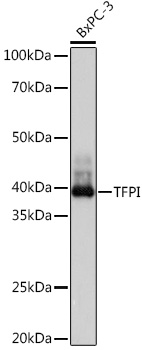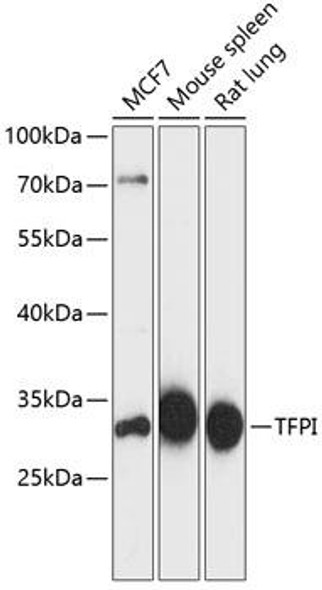Cardiovascular Antibodies
Anti-TFPI Antibody (CAB8704)
- SKU:
- CAB8704
- Product Type:
- Antibody
- Reactivity:
- Human
- Host Species:
- Rabbit
- Isotype:
- IgG
- Antibody Type:
- Monoclonal Antibody
- Research Area:
- Cardiovascular
Description
| Antibody Name: | Anti-TFPI Antibody |
| Antibody SKU: | CAB8704 |
| Antibody Size: | 20uL, 50uL, 100uL |
| Application: | WB |
| Reactivity: | Human |
| Host Species: | Rabbit |
| Immunogen: | A synthesized peptide derived from human TFPI |
| Application: | WB |
| Recommended Dilution: | WB 1:500 - 1:2000 |
| Reactivity: | Human |
| Positive Samples: | BxPC-3 |
| Immunogen: | A synthesized peptide derived from human TFPI |
| Purification Method: | Affinity purification |
| Storage Buffer: | Store at -20'C. Avoid freeze / thaw cycles. Buffer: PBS with 0.02% sodium azide, 0.05% BSA, 50% glycerol, pH7.3. |
| Isotype: | IgG |
| Sequence: | Email for sequence |
| Gene ID: | 7035 |
| Uniprot: | P10646 |
| Cellular Location: | |
| Calculated MW: | 35-45kDa |
| Observed MW: | 38KDa |
| Synonyms: | EPI, LACI, TFI, TFPI1 |
| Background: | This gene encodes a Kunitz-type serine protease inhibitor that regulates the tissue factor (TF)-dependent pathway of blood coagulation. The coagulation process initiates with the formation of a factor VIIa-TF complex, which proteolytically activates additional proteases (factors IX and X) and ultimately leads to the formation of a fibrin clot. The product of this gene inhibits the activated factor X and VIIa-TF proteases in an autoregulatory loop. Inhibition of the encoded protein restores hemostasis in animal models of hemophilia. This gene encodes multiple protein isoforms that differ in their inhibitory activity, specificity and cellular localization. [provided by RefSeq, Jul 2016] |
| UniProt Protein Function: | Inhibits factor X (X(a)) directly and, in a Xa-dependent way, inhibits VIIa/tissue factor activity, presumably by forming a quaternary Xa/LACI/VIIa/TF complex. It possesses an antithrombotic action and also the ability to associate with lipoproteins in plasma. |
| NCBI Summary: | This gene encodes a Kunitz-type serine protease inhibitor that regulates the tissue factor (TF)-dependent pathway of blood coagulation. The coagulation process initiates with the formation of a factor VIIa-TF complex, which proteolytically activates additional proteases (factors IX and X) and ultimately leads to the formation of a fibrin clot. The product of this gene inhibits the activated factor X and VIIa-TF proteases in an autoregulatory loop. Inhibition of the encoded protein restores hemostasis in animal models of hemophilia. This gene encodes multiple protein isoforms that differ in their inhibitory activity, specificity and cellular localization. [provided by RefSeq, Jul 2016] |
| UniProt Code: | P10646 |
| NCBI GenInfo Identifier: | 125932 |
| NCBI Gene ID: | 7035 |
| NCBI Accession: | P10646.1 |
| UniProt Secondary Accession: | P10646,O95103, Q53TS4, |
| UniProt Related Accession: | P10646 |
| Molecular Weight: | 28,653 Da |
| NCBI Full Name: | Tissue factor pathway inhibitor |
| NCBI Synonym Full Names: | tissue factor pathway inhibitor |
| NCBI Official Symbol: | TFPI |
| NCBI Official Synonym Symbols: | EPI; TFI; LACI; TFPI1 |
| NCBI Protein Information: | tissue factor pathway inhibitor |
| UniProt Protein Name: | Tissue factor pathway inhibitor |
| UniProt Synonym Protein Names: | Extrinsic pathway inhibitor; EPI; Lipoprotein-associated coagulation inhibitor; LACI |
| Protein Family: | Tissue factor pathway inhibitor |
| UniProt Gene Name: | TFPI |
View AllClose







